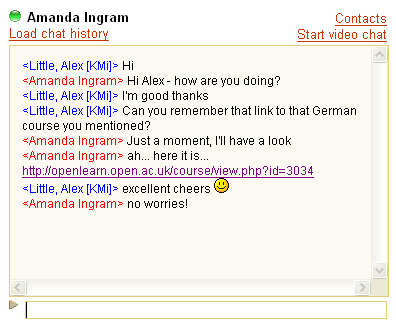About

MSG was a Web 2.0 application that provided basic instant messaging functionality accessible through a standard web browser. It was designed for environments where software installation was impractical, such as networks restricted by firewalls or proxies. MSG was open source and built on the Jabber/XMPP protocol, commonly used by platforms like Google Talk.
An additional tool, MSG Alert, was developed for Windows to maintain MSG connections when the browser was closed and to notify users of new messages. The development of MSG involved contributions from various individuals and was partly supported by the European Community’s 6th Framework Programme and the William and Flora Hewlett Foundation.
User Guide

To start MSG, users could launch it through OpenLearn or the MSG Alert. The main window displayed a contact list, indicating users’ presence statuses (e.g., online, away). Chats could be initiated by clicking on a user’s name, opening a new window for direct communication.
MSG also featured maps, allowing users to view presence icons and interact with custom maps published by group administrators. The chat interface displayed real-time status updates and message logs, with options to load previous conversations and initiate video or audio chats depending on the server.
New contacts could be added by entering their contact identifier, and personal groups could be created, though some groups were automatically generated and could not be deleted. Logging out required clicking the logout link, and using MSG Alert ensured that the session persisted until manually disconnected. Finally, tips for avoiding disruptions in different browsers were provided.
Credits
MSG client & server systems:
Chris Denham
Moodle integration:
Alex Little
BuddySpace Uncles:
Jiri Komzak
Martin Dzbor
Graphics and site:
Harriett Cornish
Damian Dadswell
Peter Devine
Project principal investigator:
Marc Eisenstadt
Acknowledgements
This work was partly supported by the European Community under the Information Society Technologies (IST) programme of the 6th Framework Programme for RTD through project ELeGI, contract IST-002205. The software and its documentation did not represent the opinion of the European Community, and the European Community was not responsible for any use made of the data and tools provided.
We also gratefully acknowledge support from the William and Flora Hewlett Foundation, which enabled us to extend MSG to become part of the larger “Open Content Initiative” OpenLearn project at the Open University.